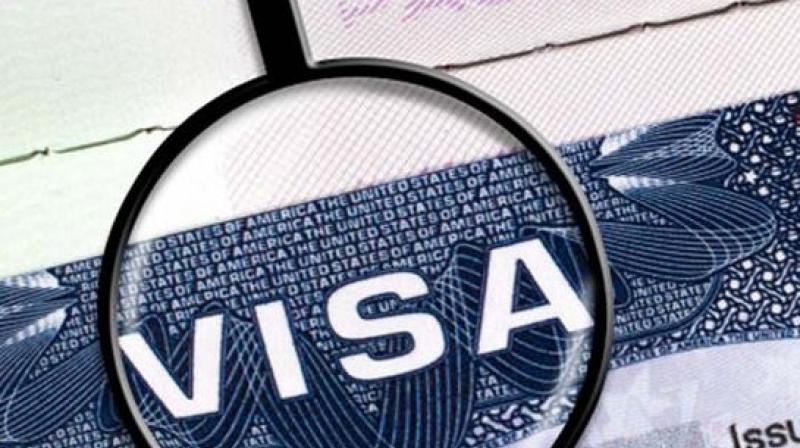Privacy breach: United States to dig into people's lives for visa applications
Seeks to tap into social media for details for all types of visas.

Hyderabad: Social media details, including usernames, previous email addresses, and phone numbers, could be sought from US visa applicants in future as part of the visa vetting process. This is still at the proposal stage with the US State Department seeking public comments. The requirement will be for all types of visas, immigrant and non-immigrant and impact nearly 15 million foreigners who apply for US visas every year. The US State Department, in documents to be published in Friday’s Federal Register website noted that it wants to get public comments on this proposal. According to the document, one particular question lists several social media platforms and asks the visa applicant to provide any identifiers used for those platforms during the five years preceding the date of application. The proposal documents were posted on Thursday but the 60-day public comment period commences on Friday after the edition is published.
These social media checks were announced last year too. A couple of years back, Facebook chats gave information to immigration officials that some students from Hyderabad were more interested in earning money by taking up jobs instead of pursuing studies. “The incidents that happened in the past may be the reason for officials to take the social media path. Since people share a lot of details on social media in personal chats or on posts, the actual intention of the person can be revealed. This proposal will not go forward as the public would certainly veto it,” said Subhakar Alapati, director of Global Tree Overseas Education and Immigration Consultant, Hyderabad.
While the world is debating privacy of data on social media, this proposal is seen as an intrusion into a person’s privacy. “While social media posts are a great way to really read into the character of people, everyone who vents on a public platform due to unhappiness, frustration or fear, isn’t necessarily a threat,” says Sabina Xavier, Chief Operating Officer of Y-Axis Consultancy. It’s doubtful whether such checking will do much to protect national security, but it will add to the workload of immigration officers.
Multiple H-1B applications would attract rejection
Multiple H-1B applications for the same person with different job offers will be rejected, the US Citizenship and Immigration Services has warned ahead of the H-1B visa filing season commencing on April 2. In a policy memorandum released on Friday, USCIS said that it will “deny or revoke the approval of all H-1B cap-subject petitions filed for that beneficiary.”
USCIS highlighted the case of an applicant who filed from two companies for one client project. It stated that Company S-Inc and C-LLC filed H-1B petitions for the same candidate to work in substantially the same position for the same end-client through the same two vendors in the same fiscal year. People have been exploiting the lottery process because the probability of a person with multiple nominations getting picked is higher. There were allegedly several instances in the city itself where multiple visa applications were filed for the same person using this loophole.
“Very rarely does a company file multiple applications for the same beneficiary because two distinct positions exist. This is a loophole that they tend to use to increase their chances of getting in their employee. Unfortunately, Indian tech companies get the giant’s share of the H-1B and it is misused by them,” said Sabina Xavier, Chief Operating Officer of Y-Axis Consultancy.
Submitting multiple applications undermines the lottery system and is misused by employers who are exploiting the system. “People often employ these tactics to improve their chances of winning. For 65,000 visas, if a person files two petitions, then he/she will have probability of 2/65000 and not 1/65000,” said Subhakar Alapati, director of Global Tree Overseas Education and Immigration Consultant, Hyderabad.
JNTU, Osmania University Alumni hold most H-1B
Most H-1B visa holders from India in 2017 were students from Jawaharlal Nehru Technological University (JNTU) or colleges affiliated to it. Around 747 BTech alumni from JNTU secured H-1B visas in 2017, while Anna University, Chennai, was the leader with nearly 850 graduates. Four of the top 10 universities in which most of the H-1B visa-holders were educated are in Andhra Pradesh and Telangana. Some 223 alumni of Osmania University, 153 of Andhra University and 138 of Acharya Nagarjuna University were given H-1B visas, according to data sourced by Quartz from the Office of Foreign Labour Certification.
This seems to suggest that it’s not true that graduates and post-graduates of IITs, IIMs and BITS Pilani prefer to work abroad; most of those who went to the US on H-1B visas are from other universities. At the Master’s level, too, the largest number of those hired in 2017 was from JNTU and Anna University. Experts say that this is not surprising as many tech-hubs and companies are in South India.
“The Indian tech giants are heavily vested in Chennai, Bangalore and Hyderabad and that’s where the bulk of their workforce is. So, it’s expected that majority of the applicants come from Anna University, JNTU, Madras University or Osmania University,” says an expert. The fact that more students from Telugu states apply for the visa could be attributed to the craze among Telugu people to go abroad. “While 30 per cent of H-1B visa holders are Indians, about 70 per cent of these are from the south. People are inclined to pursue engineering and go abroad unlike other states where they pursue different disciplines, including literature and the arts,” says another expert.

